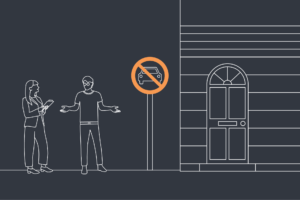So, you’re thinking of selling your home? The first step to unlocking its worth is to invite an estate agent over for a valuation. That’s where the magic (and market insight) happens. With a solid valuation in hand, you’ll know what kind of price to aim for and what buyers might pay. But how does an agent come up with that number? Read on for the Davies & Davies inside scoop…

What’s a market appraisal when it’s at home?
A home valuation is the agent’s educated guess at what buyers might be willing to shell out for your home. They’ll look at a mix of data, including:
- How your home stacks up against others nearby
- The state of the local property market
- The features of your home that could appeal to potential buyers
What really happens during an appraisal?
It’s normal to feel a bit jittery about a home valuation; after all, an expert is coming in to scrutinise every corner. But here’s what you can expect:
- Research on local property prices, recent sales, and neighbourhood trends
- Insight on transport links, schools, and amenities
- A market assessment at the time of valuation
- A detailed walk-through of your home, including general notes of the size of spaces within the home (exact measurements are undertaken by a professional at a later date)
Let’s break down what the agent will really look at during a home valuation (besides your taste in framed cat pics):
Property type and tenure
Is your home detached, semi-detached, or a charming terraced house? Maybe it’s a flat? The type matters, as does the tenure:
- Freehold homes (where you own the building and land) are typically worth more than leasehold properties.
- Other factors like plot size, conservation area status, listed status, and council tax band also impact the valuation.

The Condition Report
A fresh, well-kept home can fetch a higher price than one that needs a bit of TLC. Expect the agent to examine:
- Windows, doors, and woodwork
- Décor, fixtures, and plumbing (like your trusty boiler)
- Signs of damp or subsidence (from a visual standpoint)
- Garden space
Your agent might also ask questions about your property’s maintenance, such as when the boiler was last serviced or if your windows have been upgraded.
Space and layout
In real estate, size matters! A home with more rooms, square footage, and storage is generally valued higher. Your agent will check out:
- How much usable space there is
- The overall flow from room to room
- Bedroom and bathroom count
- Usability of outdoor spaces
- How to make better use of the space
- How it can be extended
The heart of the home: your kitchen
In today’s market, a great kitchen can bump up your property’s value by around 10%. And if you’ve got an open-plan kitchen and dining area, that’s even better. Small upgrades like fresh paint on cabinets, a new worktop, or additional storage units can make a difference.

Location, Location, Location!
A rather cliched old saying (and show), but it’s true – location can be the biggest factor affecting your home’s value. Your agent will consider:
- Proximity to amenities and transport
- School catchment zones
- The appearance of the neighbourhood
- Garden orientation (yes, the way your garden faces matters!)
Potential to expand
An agent doesn’t just look at what’s there; they’ll also assess your home’s potential for expansion. A big garden might make your property ideal for a rear extension, or a loft could be ripe for a conversion.
Fixtures and fittings and all the trimmings
Fixtures and fittings like sinks, built-in appliances, and flooring quality add value if they’re high-quality and match your home’s overall look. On the other hand, worn or dated fixtures could have the opposite effect. Does your home have original period features, like Victorian sash windows or an Edwardian fireplace? Agents know buyers love unique touches, especially if they’re well-maintained. These unique qualities can help set your property apart and add value.
How do I help my agent out?
Be open and honest! Share information on any upgrades, past work done, or quirks you think might add appeal. Market appraisals generally take about an hour. You’ll usually have the results within the next day or so with initial thoughts shared during the home valuation.
Should I tidy up for the appraisal?
Yes, we know it’s quite literally a chore – but absolutely. A tidy, clutter-free home shows off your property’s best features, allowing the agent to see its true potential.
Thinking about selling? Start by knowing where you stand. A valuation is a great way to understand your home’s market worth and get ready for the next steps. Good luck, and happy selling!
Book your free, no obligation, property valuation by clicking here
Contact us:
mark@daviesdavies.co.uk – Sales Director (contact for sales, lettings and new homes)
katrina@daviesdavies.co.uk – Head of Property & Block Management (contact for property and block management)
0207 272 0986
Davies & Davies Estate Agents, 85 Stroud Green Road, London, N4 3EG
Article & images by Barefaced Studios
You might also want to read other useful blog articles by clicking here.
Please note that all content contained within our website is for informational purposes only. You should not construe any such information or other material as legal, tax, investment, financial, or other advice. All Content on this site is information of a general nature and does not address the circumstances of any particular individual or entity. We advise seeking professional advice from a legal, financial, or other professional.

One of the most common questions we’re asked by homeowners in North London is whether there’s a “best” time of year to put a property on the market. The short answer is: there are stronger and quieter months – but the right timing always depends on your circumstances and your local market. Understanding how buyer behaviour changes throughout the year can help you choose the moment that gives your property the best chance of attracting interest, securing viewings and achieving a successful sale.
Read More...
If you’ve been watching the property market like a curious North Londoner hawk, you may have spotted a theme: 2026 is shaping up to be a pivotal year for sellers. After a period of uncertainty in 2025, the housing market is rebounding, but it’s doing so with its own rhythms and nuances. For homeowners in North London and beyond, understanding what’s driving buyer confidence, how mortgage rates are evolving, and when demand tends to peak could make the difference between a smooth sale and a stalled one. So buckle in, sellers, we’re hitting the market…
Read More...
Becoming a landlord used to feel like a sure-fire investment: you bought a property, placed a tenant in it, collected rent, and watched both the income and the value grow. Those straightforward days, however, have been challenged by a cocktail of higher costs, tougher regulation and shifting demand. So if you’re sitting on a buy-to-let (BTL) property or thinking of entering the market, you might be asking: does it still pay? Let’s look at the pros and cons in today’s climate.
Read More...Get in Touch
Opening Times
Mon – Thurs: 0900 – 1815
Fri: 0900 – 1800
Sat: 1000 – 1600
Sun: Appointments by request